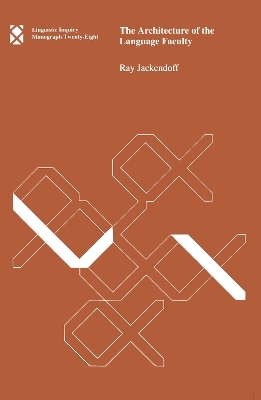
The Architecture of the Language Faculty
MIT Press (Verlag)
978-0-262-60025-5 (ISBN)
- Titel ist leider vergriffen;
keine Neuauflage - Artikel merken
Over the past twenty-five years, Ray Jackendoff has investigated many complex issues in syntax, semantics, and the relation of language to other cognitive domains. He steps back in this new book to survey the broader theoretical landscape in linguistics, in an attempt to identify some of the sources of the widely perceived malaise with respect to much current theorizing. Starting from the "Minimalist" necessity for interfaces of the grammar with sound, meaning, and the lexicon, Jackendoff examines many standard assumptions of generative grammar that in retrospect may be seen as the product of historical accident. He then develops alternatives more congenial to contemporary understanding of linguistic phenomena. The Architecture of the Language Faculty seeks to situate the language capacity in a more general theory of mental representations and to connect the theory of grammar with processing. To this end, Jackendoff works out an architecture that generates multiple co-constraining structures, and he embeds this proposal in a version of the modularity hypothesis called Representational Modularity. Jackendoff carefully articulates the nature of lexical insertion and the content of lexical entries, including idioms and productive affixes. The resulting organization of the grammar is compatible with many different technical realizations, which he shows can be instantiated in terms of a variety of current theoretical frameworks. Linguistic Inquiry Monograph No. 28
Ray Jackendoff is Seth Merrin Professor of Philosophy and Codirector of the Center for Cognitive Studies at Tufts University. He is the author of many books, including Foundations of Language.
Questions, goals, assumptions - universal grammar, necessities and assumptions, syntactocentrism and perfection; interfaces, representational modularity - the 'articulatory-perceptual' interfaces, the phonology-syntax interface, the 'conceptual-intentional' interface, embedding mismatches between syntactic structure and conceptual structure, the tripartite parallel architecture, representional modularity; more on the syntax-semantics interface - enriched composition, aspectual coercions, reference transfer functions, arguments structure alternations, adjective-noun modification, summary, anaphora, quantification, remarks; the lexical interface - lexical insertion versus lexical licensing, PIL=CIL, PIL and CIL are at S-structure, checking argument structure, remarks on processing, the lexicon in a more general mental ecology; lexical entries, lexical rules - broadening the conception of the lexicon, morphosyntax versus morphophonology, inflectional versus derivational morphology, productivity versus semiproductivity, psycholinguistic considerations, 'optimal coding' of semiproductive forms, final remarks; remarks on productive morphology - introduction, the place of traditional morphophonology, phonological and class-based allomorphy, suppletion of composed forms by irregulars, the status of zero inflections, why the lexicon cannot be minimalist; idioms and other fixed expressions - reviews of the issues, the wheel of fortune corpus: if it isn't lexical, what is it? lexical insertion of idioms as Xos, lexical licensing of units larger than Xo, parallels between idioms and compounds, syntactic mobility of (only) some idioms, idioms that are specializations of other idiomatic constructions, relation to construction grammar, summary; epilogue: how language helps us think - introduction, brain phenomena opaque to awareness, language is not thought, and vice versa, phonetic form is conscious , thought is not, the significance of consciousness again, first way language helps us think: linguistic communication, second way language helps us think: making conceptual structure available for attention, third way language helps us think: valuation of conscious percepts, summing up,
| Reihe/Serie | Linguistic Inquiry Monographs ; 28 |
|---|---|
| Verlagsort | Cambridge, Mass. |
| Sprache | englisch |
| Maße | 152 x 229 mm |
| Gewicht | 431 g |
| Themenwelt | Geisteswissenschaften ► Philosophie ► Sprachphilosophie |
| Geisteswissenschaften ► Sprach- / Literaturwissenschaft ► Sprachwissenschaft | |
| ISBN-10 | 0-262-60025-0 / 0262600250 |
| ISBN-13 | 978-0-262-60025-5 / 9780262600255 |
| Zustand | Neuware |
| Haben Sie eine Frage zum Produkt? |
aus dem Bereich


